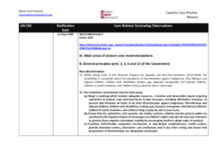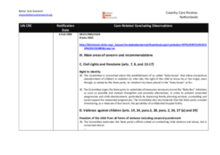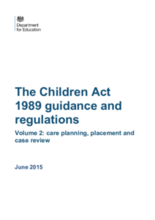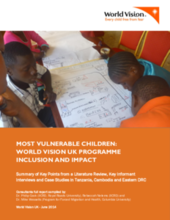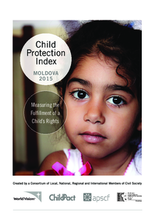Displaying 941 - 950 of 1759
This country care review includes the care related Concluding Observations adopted by the Committee on the Rights of Persons with Disabilities and the Committee on the Rights of the Child.
This country care review includes the care related Concluding Observations adopted by the Committee on the Rights of the Child.
In this article, the author offers a response to the recommendations made to the government of the Czech Republic by the UN Committee on the Rights of the Child (UNCRC).
On June 2, 2015, the USAID Center on Children in Adversity/Displaced Children and Orphans Fund hosted a panel discussion event with the CPC Learning Network to mark the tenth anniversary of the Network.
This rapid review of the literature on residential care for looked-after children in the UK aims to describe the use of residential care for children within the child welfare systems of England and other relevant countries; review the evidence on children’s outcomes from residential care; and review the quality of the evidence and identify gaps in the evidence base in order to inform future research priorities.
Volume 2 of the Children Act 1989 Guidance and Regulations provides guidance, primarily addressed to local authorities and their staff in England, about their functions under Part 3 of the Children Act 1989 which concerns the provision of local authority support for children and families. In particular it describes how local authorities should carry out their responsibilities in relation to care planning, placement and case review for looked after children.
The Child Protection Index (the Index) is a comparative policy tool, organised and implemented by local and national level civil society organisations, that examines a country’s current child protection system using a common set of 626 indicators that measure a country’s policy and actions toward greater child protection. This Index measures Georgia’s efforts toward child protection in comparison with other countries in the region.
The purpose of the research highlighted in this report was to assess and analyze the extent to which World Vision UK is reaching ‘the most poor and marginalised’ or Most Vulnerable Children (MVC) through its Child Protection programming in Cambodia, Tanzania, and Eastern DRC.
In this executive summary, the Truth and Reconciliation Commission of Canada provides an introduction to the use of residential schools for aboriginal children in Canada, presents an overview of the Commission’s activities, describes the history and legacy of these residential schools, and outlines the challenges of reconciliation, including 94 recommendations, or “calls to action” for reconciliation in the field of Child Welfare among many others.
The Child Protection Index (the Index) is a comparative policy tool, organised and implemented by local and national level civil society organisations, that examines a country’s current child protection system using a common set of 626 indicators that measure a country’s policy and actions toward greater child protection. This Index measures Moldova’s efforts toward child protection in comparison with other countries in the region.

